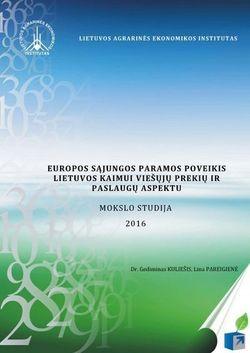
In the end of XX century the approach to agriculture and rural development in the European Union began to change. From the concentration to development of competitive agriculture, the attention was focused on rural areas as whole, on the public needs not only for food, but other areas too. In the ninth decade of the XX century the attention was paid on the significance of agriculture activity consequences for environment, the agriculture recognized as one of the most important creator of public services. Attention was focused not only on agricultural production, but the quality of food, the health of consumers, the biodiversity, environmental resources, rural vitality, local culture and traditions became important. The European Union began to support rural development in a broader sense, the one of the supply sphere - public services. The use of public funds for the public services raises the demand to measure the effectiveness.
The aim of this work - to assess the support of EU for the rural regions as the public service providers.
The study analyses the changes of the rural policy in a sense of the public service creation. The changes in supply of public services in Lithuania discussed. The practices of EU support impact measurements analyzed. The evaluation of the impact of EU support for Lithuanian rural regions was done.
Quantitative and qualitative scientific research methods were used in this work: analysis of the scientific literature, documents, secondary statistical data analysis was performed, comparative methods, logical comparison, questionnaire surveys were used. Lithuanian municipalities were grouped according received EU support volume and impact on demographic, social, economic indicators was analyzed. The study showed that in those Lithuanian rural regions, where EU support was bigger, the decline of population was slower, increased direct investment volumes, increased amount of declared area. The greater amount of support did not made a noticeable impact on number of small and medium-sized enterprises dynamic, as well as for employment.
The interview with rural municipality elders and active rural community leaders showed that people in rural areas became more positive, positively evaluates EU support, they became more open for society, communicative, the more attention was paid on self-help and their living environment management.
Kuliešis, G.; Pareigienė, L. 2016. Europos Sąjungos paramos poveikis Lietuvos kaimui viešųjų prekių ir paslaugų aspektu: Mokslo studija. Vilnius: Lietuvos agrarinės ekonomikos institutas. 76 p.: iliustr., santr. angl. (online) ISBN 978-9955-481-61-4.
